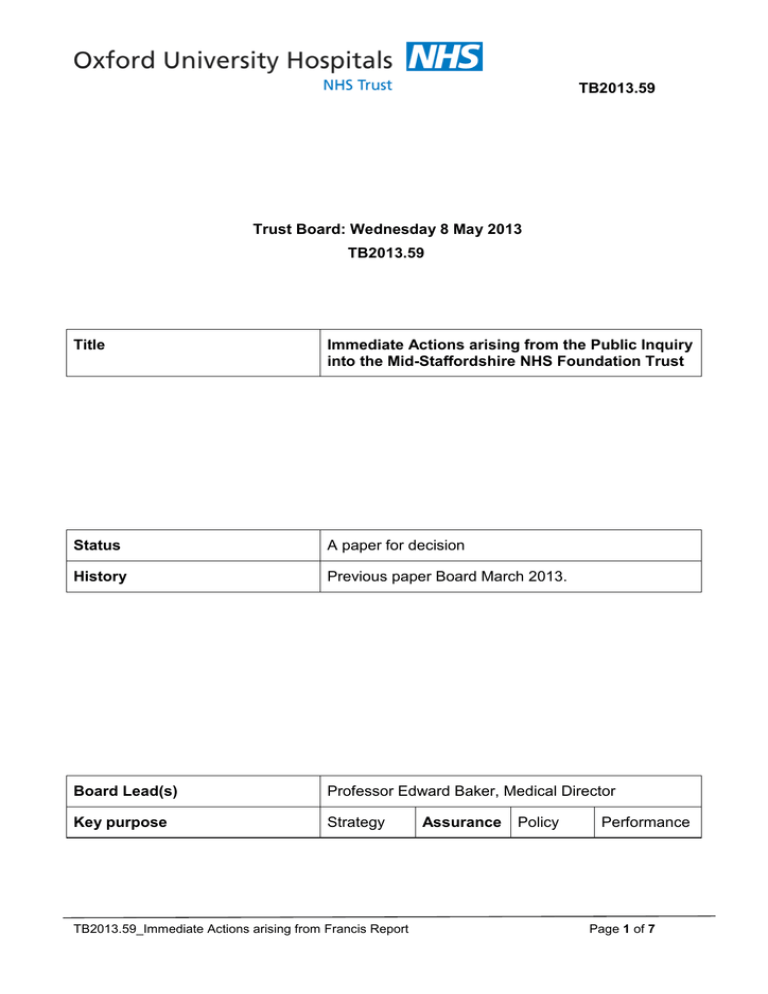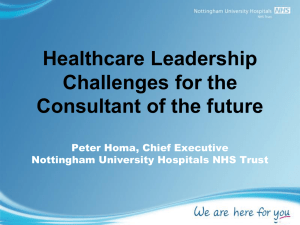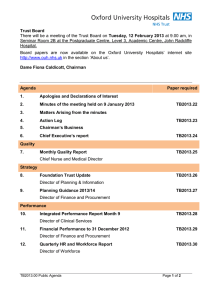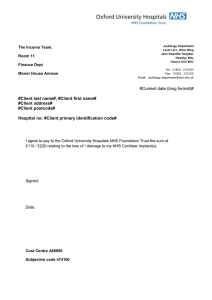TB2013.59 Trust Board: Wednesday 8 May 2013 Title
advertisement

TB2013.59 Trust Board: Wednesday 8 May 2013 TB2013.59 Title Immediate Actions arising from the Public Inquiry into the Mid-Staffordshire NHS Foundation Trust Status A paper for decision History Previous paper Board March 2013. Board Lead(s) Professor Edward Baker, Medical Director Key purpose Strategy TB2013.59_Immediate Actions arising from Francis Report Assurance Policy Performance Page 1 of 7 Oxford University Hospitals TB2013.59 Summary 1 The Government published its initial response to the Francis report on March 28th 2013. 2 The Government does not respond in detail to all the recommendations of the report. It presents its plans under five headings: preventing problems, detecting problems quickly, taking action promptly, ensuring robust accountability and ensuring staff are trained and motivated. 3 In the light of this response and the Board’s previous discussion of the Francis report, this paper proposes immediate actions that the Trust should take in response to Francis. 4 These actions concentrate on culture and leadership, concerns raised by staff, listening to complaints and the patient voice, internal review of clinical services against explicit standards, clinical risk management and review of mortality. 5 The Trust Board is asked to note the Government’s initial response to the Francis Report and discuss and agree the immediate priorities for action by the Trust. TB2013.59_Immediate Actions arising from Francis Report Page 2 of 7 Oxford University Hospitals TB2013.59 Background 1. At its meeting on 13th March 2013 the Board considered a paper discussing the report of the Public Inquiry into the Mid Staffordshire NHS Foundation Trust, chaired by Robert Francis QC. 2. Francis identified five themes in his 290 recommendations recommendations are summarised under these headings below. 3. A structure of fundamental standards and measures of compliance. 3.1 There should be a set of clearly understood core values and fundamental standards embedded in a strengthened NHS constitution. 3.2 The fundamental standards should be easily understood and accepted by patients, the public and healthcare staff, breaches of them should not be tolerated. They should be rigorously enforced. 3.3 NICE should develop standard procedures for measuring compliance with the fundamental standards. Providers who cannot meet these standards should not provide the service. 3.4 The standards should be enforced by the CQC which should become the single regulator dealing in addition with corporate governance, financial competence, viability and subsuming the functions of Monitor. 3.5 The CQC should have power to prosecute where fundamental standards are breached. 3.6 Commissioners should be given an enhanced role is assessing provider quality. 4. Openness, transparency and candour throughout the system underpinned by statute. 4.1 There should be a statutory duty of candour. 4.2 Staff should be obliged to tell employers about incidents that might cause harm to patients. Misleading commissioners or regulators or making false statements in trust quality accounts should also be criminal offences. 4.3 New rules should govern the release of information to Coroners. Transparency between different regulators and between them and Coroners should be increased. 5. Improved support for caring, compassionate, and considerate nursing. 5.1 There should be changes to nurse recruitment training to make it more practically based. 5.2 Nursing leadership at ward level should be enhanced. 5.3 There should be Responsible Officers for nursing and a process of revalidation for nurses should be considered. 5.4 A new specialism in older person’s nursing should be considered. TB2013.59_Immediate Actions arising from Francis Report and Page 3 of 7 the Oxford University Hospitals 5.5 TB2013.59 There should be common standards of training and registration for healthcare support workers. 6. Stronger healthcare leadership. 6.1 An NHS leadership college should be created. Senior managers should be trained in ethics. 6.2 There should be a "fit-and-proper" test for Directors of providers who must comply with a written code of conduct. 6.3 NHS complaints handling should be improved. 6.4 Commissioners should be more involved in the complaints process with access to all the information about individual complaints, undertaking their own investigation where necessary. 6.5 Trusts should publish more details of individual complaints on their websites. 6.6 The role of Foundation Trust Governors should be extended. 7. Accurate, useful and relevant information. 7.1 There should be clear widely used metrics on clinical quality. 7.2 The NHS Information Centre should independently collect, analyse and publish healthcare information. 7.3 Each clinical service must publish real-time data on patient safety and compliance with minimum quality standards. 7.4 Each provider should have a Board member with a responsibility for information. Immediate issues arising from the report 8. The Board paper of 13th March highlighted some immediate issues that the OUH should consider in response to the Public Inquiry report. 9. The first of Francis’ recommendations is: 9.1 All commissioning, service provision regulatory and ancillary organisations in healthcare should consider the findings and recommendations of this report and decide how to apply them to their own work. 9.2 Each such organisation should announce at the earliest practicable time its decision on the extent to which it accepts the recommendations and what it intends to do to implement those accepted, and thereafter, on a regular basis but not less than once a year, publish in a report information regarding its progress in relation to its planned actions. 10. Culture 10.1 The overarching finding of the Public Inquiry report is that there needs to be a radical change in culture within the NHS. The OUH needs to consider TB2013.59_Immediate Actions arising from Francis Report Page 4 of 7 Oxford University Hospitals TB2013.59 whether the work already underway is sufficient to meet the expectations of this report. 11. Complaints 11.1 In the light of the criticism of complaint handling in the report, the OUH should consider whether its complaints handling process needs revisiting. 12. Risk management 12.1 Our approach to managing clinical risk will have to change to one comparable to that for health and safety. 13. Mortality 13.1 The OUH has initiated a process of comprehensive review of all deaths to identify improvements in care. This needs to be given priority in our clinical quality work programme. 14. Response to quality concerns 14.1 OUH should review how it responds once a concern is raised to ensure that it is investigated and effectively addressed rapidly. Government response to the Inquiry 15 The Government has subsequently published its initial response to the Public Inquiry report on 28th March. The response takes its title from a phrase used by Francis “Patients First and Foremost”. 16. The Government’s response does not try to respond to all of Francis’ recommendations. It focuses on the themes it identifies from the report. The actions proposed are presented under these five headings. 17. Preventing problems 17.1 The culture of the NHS will be addressed to increase transparency, enhance leadership and strengthen accountability. 17.2 Paperwork, box ticking, duplicity of regulation and information burdens will be reduced by at least one third. 17.3 The Chief Inspector of Hospitals will create a balanced scorecard presenting a single version of the truth. 17.4 There will be a single national portal, the Health and Social Care Information Centre, for collecting information. 17.5 The review led by Don Berwick will promote a culture focused on safety with zero tolerance for avoidable harm. 17.6 The NHS constitution will be amended to reflect the new culture. TB2013.59_Immediate Actions arising from Francis Report Page 5 of 7 Oxford University Hospitals TB2013.59 18. Detecting problems quickly a) Expert led inspections will take place of all hospitals. Each hospital will have a single balanced assessment that will reflect what is important to patients. b) Hospitals will be rated as outstanding, good, requiring improvement or poor. c) Clinical outcomes will be published for an increasing number of specialities. d) There will be sanctions, possibly criminal, against organisations that misreport data. e) There will be a statutory duty of candour. f) There will be a review of best practice in the management of complaints. 19. Taking action promptly a) A new set of fundamental standards will be drawn up by the CQC. b) The CQC will no longer take action against hospitals where poor quality is identified; this responsibility will rest with the board of the hospital and Monitor or the NHS Trust Development Authority. c) If this does not resolve the issues, the Chief Inspector of Hospitals will be able to initiate a failure regime, eventually leading to the hospital being put into administration. 20. Ensuring robust accountability a) Criminally negligent practice will become the responsibility of the Health and Safety Executive. b) There will be a review of the legislation governing the role of the General Medical Council and the Nursing and Midwifery Council. c) There will be national barring list of unfit managers and unsuitable healthcare assistants. 21. Ensuring staff are trained and motivated a) Nursing students will be required to undertake a year as a healthcare assistant. b) A national scheme of revalidation will be introduced for nurses. c) There will be enhancements to the role of the NHS Leadership Academy. d) Every Department of Health civil servant will have “real and extensive” frontline experience of caring for patients. Immediate actions for the OUH 22. 23. The Trust will need in due course to consider how it will respond to Francis’ recommendation highlighted under paragraph 9.2 above. At this stage the Trust should act on the immediate major issues identified by Francis, highlighted under paragraphs 10.0 to 14.0 taking into account the Government’s initial response. The proposed immediate actions are set out below. TB2013.59_Immediate Actions arising from Francis Report Page 6 of 7 Oxford University Hospitals 24. 25. 26. 27. 28. 29. 30. TB2013.59 The Trust should review its staff engagement and leadership development programmes to ensure they address the cultural issues raised in the Francis report. It should consider whether any further steps need to be taken in developing a “patient first” culture. The Trust should build on the current review of its raising concerns policy to ensure that clinical quality concerns are recognised and investigated quickly and where necessary effective action is taken without delay. The Trust should review its processes for listening to patients and handling complaints to ensure they effectively bring the patient voice to bear in all clinical services. The Trust should develop an internal peer review process to ensure all clinical services are delivered consistently according to expected, objective standards. The Trust should review its clinical staffing models for frontline staff in all areas to ensure that they are appropriate to deliver care to these standards. The Trust should strengthen it clinical risk management function and review the resources supporting quality governance at corporate and divisional level. The Trust should build on and strengthen its current mortality review programme. Recommendations 31. The Trust Board is asked to: a) note the Government’s initial response to the Francis report. b) discuss and agree the immediate priorities for action by the Trust. Professor Edward Baker Medical Director May 2013 TB2013.59_Immediate Actions arising from Francis Report Page 7 of 7


